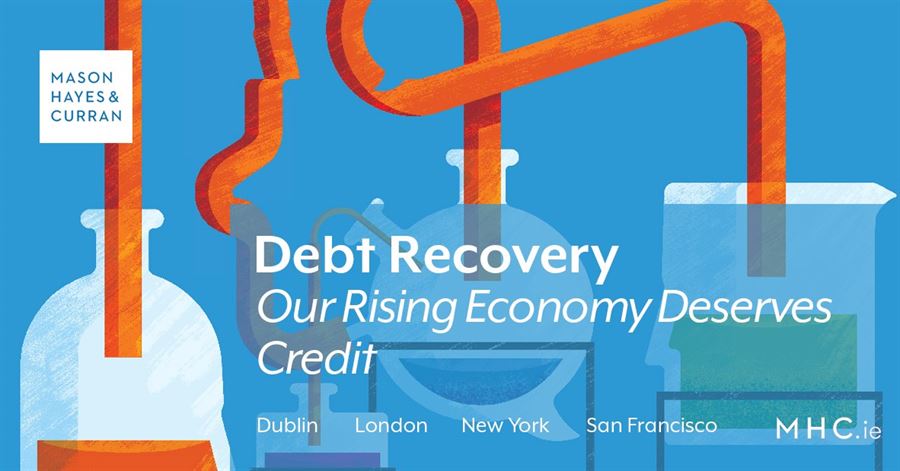
Figures circulated in 2019 by the Courts Service saw a small rise in the volume of debt recovery litigation. Otherwise, the headline issues in debt recovery in 2019 were those which dominated most of the decade i.e. the resolution of the Irish mortgage arrears, Brexit and the interaction of data protection law with credit and collections.
Creditor litigation and enforcement
The frequency of creditors using the legal system to collect debt is evident in the numbers of monetary judgments obtained year-on-year in the most recent Courts Service Annual Reports. These numbers had fallen dramatically over the past decade from a peak of just under 50,000 default judgments in 2010, down to 9,637 in 2017. 2019, however, saw a slight rise to over 11,600 judgments, reflecting a post-recession increase in credit offered by lenders and businesses. Perhaps moderated by the effects of the economic recession, this extension of credit has been at relatively low levels. This is demonstrated by the fact that these monetary judgments were obtained predominantly at District Court level i.e. for amounts not exceeding €15,000. Corresponding figures for court-based enforcement remedies used by creditors, such as instalment order applications and judgment mortgage certificates, bear out this trend. We discuss these statistics in more detail here.
Resolution of the mortgage arrears crisis
The topic of mortgage arrears has dominated much of debt recovery related news over the past decade and 2019 was no different. Indeed, in its Strategic Plan 2019 to 2021 the Central Bank of Ireland, in focusing on strengthening resilience in the financial sector noted that addressing mortgage arrears and non-performing loans continues to be a key theme, as is effective supervision of those in the sector. This focus was mirrored in two headline legislative developments, i.e. (1) the commencement of the Consumer Protection (Regulation of Credit Servicing Firms) Act 2018 and (2) the enactment of the Land and Conveyancing Law Reform (Amendment) Act 2019. We previously explored both pieces of legislation here.
Whilst the tsunami of repossession court cases that had been predicted in the past by some commentators has not materialised, many non-performing mortgage loans have been the subject of portfolio sales by Irish lenders to investment funds in recent years. This trend continued in 2019.
Another trend in this area has been an increase in the utilisation of personal insolvency options by secured borrowers. We looked at one particularly high profile case before the courts in 2019.
In light of the increased protections extended to borrowers over the past decade though, if these funds cannot reach a deal with their newly-acquired borrowers, they will need court orders to take possession of the secured properties. We may yet see an increase in fund driven mortgage litigation in the years ahead.
Brexit/data transfers
As the days wound down to the 29 March and later the 31 October deadlines, it seemed that a ‘hard Brexit’ was about to become a reality during 2019. Understandably this caused a lot of concern among Irish entities and the wider EU business community. It is unlikely that the reciprocal enforcement of EU judgments in the United Kingdom and vice-versa will ever be top of the Brexit agenda, but it is an issue very relevant to creditors that we have covered in the past. The other key area that remains to be sorted is that of transfers of personal data (by creditors and others) to and from the UK. Whilst it is currently possible to freely transfer personal data between EU member states under EU data protection law, that will change if the UK becomes a “third country”, which is what would occur in a no-deal Brexit.
Debt collection is an activity that is very much reliant on the transfer of third party personal data and we advocated that creditors should have robust measures in place to deal with transfers to and from the UK, in the event of a no-deal Brexit scenario. In particular, we reviewed the guidance given to businesses by the Irish Data Protection Commissioner (DPC) and the UK Information Commissioner (ICO) and recommended in a previous insight that Irish businesses should incorporate Standard Contractual Clauses (SCCs) into contracts with the counterparties/suppliers in the UK. It would currently seem that the UK leaving the European Union with a negotiated deal is now a more likely scenario, but there is no certainly of that. As a result, our recommendation, which echoes the DPC and ICO guidance, still applies.
Conclusion
Debt recovery numbers point to an economy that has recovered significantly from its lowest ebb a few years ago. However, the outlook for the collectability of mortgage debt remains uncertain. It has to be acknowledged that recent legislative and court developments have made it more difficult for a lender or loan portfolio acquirer to take possession of a secured property. We do not see this trend being reversed anytime soon.
The regulation of certain sectors where credit is extended, such as to consumers of financial services products, will be ever more scrutinised. 2020 is likely to see increased enforcement and fines imposed by regulatory authorities, particularly the Central Bank and the Data Protection Commissioner. In addition, businesses dealing with UK customers and suppliers need to be very mindful of the legal changes that will arise from the UK leaving the EU. Be assured that we will keep creditors updated on all relevant developments.
For more information on issues arising in 2020 that might impede successful credit resolution, contact a member of our Debt Recovery team.
The content of this article is provided for information purposes only and does not constitute legal or other advice.




